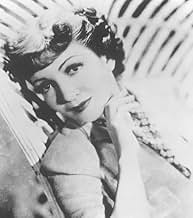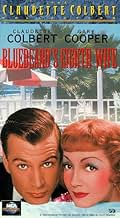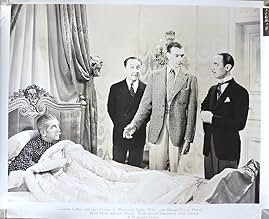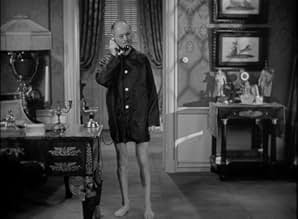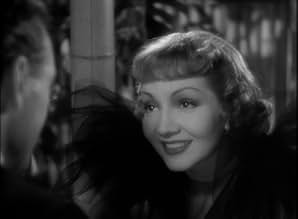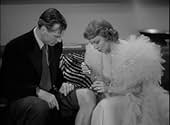Después de enterarse de que su prometido multimillonario ya se ha casado siete veces, la hija de un marqués sin dinero decide domarlo.Después de enterarse de que su prometido multimillonario ya se ha casado siete veces, la hija de un marqués sin dinero decide domarlo.Después de enterarse de que su prometido multimillonario ya se ha casado siete veces, la hija de un marqués sin dinero decide domarlo.
- Dirección
- Guionistas
- Elenco
- Premios
- 2 premios ganados en total
Mariska Aldrich
- Nurse at Door
- (sin créditos)
Leon Ames
- Ex-Chauffeur
- (sin créditos)
Lenore Aubert
- Party Guest
- (sin créditos)
Eugene Borden
- Waiter on the Stairs
- (sin créditos)
Barlowe Borland
- Uncle Fernandel
- (sin créditos)
Opiniones destacadas
Ernst Lubitsch is the guiding hand behind "Bluebeard's Eighth Wife," a 1938 comedy starring Claudette Colbert and Gary Cooper. The screenplay was written with a light touch by Brackett and Wilder.
The story concerns a wealthy man, Michael Brandon (Cooper), who meets the very attractive Nicole De Loiselle (Colbert) in a Parisian men's department store. Brandon wants to buy the top of the pajamas, as that's what he sleeps in, but the clerk insists that he buy the entire set. Nicole enters and buys the pants.
Nicole's father (Edward Everett Horton) is a penniless marquis, trying to sell a project to Brandon, who isn't interested. The marquis then attempts to get him to buy a Louis IV bathtub. When he realizes that Nicole is the marquis' daughter, the marquis sees immediately that there is interest and tries to get them together. After all, he's loaded, and the hotel bill is due.
Finally, the couple does become engaged and of course the marquis brings in his entire family at his expense for the wedding. While everyone is gathering for a photograph, some white stuff falls out of Michael's suit. "What is that?" she asks. "It's rice," he says. "Don't you use it at weddings? It's supposed to bring good luck." "Did your bride and groom have good luck?" she asks. "Well," he says, "we had a pleasant six months."
She then finds out he's been married seven times. After renegotiating some sort of prenup he has set up, she goes through with the wedding, but they live separate lives.
For some reason, people put this film in the same category as I Met Him in Paris because they're on the same DVD and they both take place in Paris. I Met Him in Paris is not a Lubitsch film and has some problems. This film has a fine script, zips along at a great pace, and has some wonderful scenes. I Met Him in Paris didn't really pick up until the second part.
Gary Cooper and Claudette Colbert are delightful. It's hard to believe that someone like Gary Cooper actually existed - tall, drop dead gorgeous, and a cowboy to boot. Talk about your perfect man. And what a smile.
Colbert is flawless in acting and in beauty - I saw her up close in 1974 and she looked the same as she did in this film. For as much success that she had, I don't think she ever received the credit for her dramatic work that she deserved, though she did for her comedy.
In her last appearance, in The Two Mrs. Grenvilles, she played an actual person, Elsie Woodward (name changed in the movie), and people who knew Elsie said Colbert was totally the character.
I don't think this is Lubitsch's best, but it's still delightful. How can you miss with those stars, that director, and those writers.
David Niven has a supporting role as an employee of Brandon's who is also a friend of Nicole's. He's very funny.
The story concerns a wealthy man, Michael Brandon (Cooper), who meets the very attractive Nicole De Loiselle (Colbert) in a Parisian men's department store. Brandon wants to buy the top of the pajamas, as that's what he sleeps in, but the clerk insists that he buy the entire set. Nicole enters and buys the pants.
Nicole's father (Edward Everett Horton) is a penniless marquis, trying to sell a project to Brandon, who isn't interested. The marquis then attempts to get him to buy a Louis IV bathtub. When he realizes that Nicole is the marquis' daughter, the marquis sees immediately that there is interest and tries to get them together. After all, he's loaded, and the hotel bill is due.
Finally, the couple does become engaged and of course the marquis brings in his entire family at his expense for the wedding. While everyone is gathering for a photograph, some white stuff falls out of Michael's suit. "What is that?" she asks. "It's rice," he says. "Don't you use it at weddings? It's supposed to bring good luck." "Did your bride and groom have good luck?" she asks. "Well," he says, "we had a pleasant six months."
She then finds out he's been married seven times. After renegotiating some sort of prenup he has set up, she goes through with the wedding, but they live separate lives.
For some reason, people put this film in the same category as I Met Him in Paris because they're on the same DVD and they both take place in Paris. I Met Him in Paris is not a Lubitsch film and has some problems. This film has a fine script, zips along at a great pace, and has some wonderful scenes. I Met Him in Paris didn't really pick up until the second part.
Gary Cooper and Claudette Colbert are delightful. It's hard to believe that someone like Gary Cooper actually existed - tall, drop dead gorgeous, and a cowboy to boot. Talk about your perfect man. And what a smile.
Colbert is flawless in acting and in beauty - I saw her up close in 1974 and she looked the same as she did in this film. For as much success that she had, I don't think she ever received the credit for her dramatic work that she deserved, though she did for her comedy.
In her last appearance, in The Two Mrs. Grenvilles, she played an actual person, Elsie Woodward (name changed in the movie), and people who knew Elsie said Colbert was totally the character.
I don't think this is Lubitsch's best, but it's still delightful. How can you miss with those stars, that director, and those writers.
David Niven has a supporting role as an employee of Brandon's who is also a friend of Nicole's. He's very funny.
It starts in the French Riviera at a dressing department store where an elegant man wants to buy pyjama tops and a woman the bottoms . He is the US multi-millionaire Michael Brandon (Gary Cooper, though miscast , at times ) who tries to marry his eight wife , called Nicole (Claudette Colbert is fine as the beautiful girl who aims to be his eighth) . After learning her multi-millionaire fiancé has already been married seven times , Nicole , daughter of a bankrupted French Marquis (Edward Everett Horton) attempts to tame the egoistic man and he then ends at an asylum . He married in haste and repeated in pleasure!
Problematic comedy and sporadically fun , set in the French Riviera about a spoiled millionaire who attempts to marry the daughter of a penniless marquis , she then decides to control him , as she doesn't want to be only a number in the row of his ex-wives and starts her own strategy to "tame" him . Good for a few laughs , based on the play by Alfred Savoir and American version by Charlton Andrews with a diverting script by prestigious Charles Brackett and Billy Wilder , though providing a wrong sort of discomfort to the closing scenes at a lunatic sanatorium . Adding some scenes justifying Ernst Lubitsch's reputation for his famous ¨Touch¨ , along with adequate as well as evocative musical score by Frederick Hollander . This Lubitsch romp contains a very good main and support cast . Gary Cooper is nice as the millionaire who who can handle money but not wives , as he has a comeuppance coming up from the eighth , though Coop seems out of place as a playboy . Claudette Colbert is perfect as the woman who aims to be his eighth and she then tries to tame him. There's astringent and typecast secondary cast from sympathetic Edward Everett Horton as the broken Marquis De Loiselle , delightful David Niven as Albert De Regnier , Elizabeth Patterson as Aunt Hedwige , Herman Bing as Monsieur Pepinard , Warren Hymer as Kid Mulligan and Franklin Pangborn as snooty Assistant Hotel Manager
The motion picture well photographed by Leo Tover was competently made by master filmmaker Ernst Lubitsch ,though softening the script's acidity, and he had previously directed Gary Cooper in Design for life . Lubitsch was a maestro director of naughty but entertaining comedies who had lots of successes . Lubitsch's breakthrough film came in 1918 with "The Eyes of the Mummy", a tragedy starring future Hollywood star Pola Negri. Also that year he made Carmen (1918), again with Negri, a film that was commercially successful on the international level. His work already showed his genius for catching the eye as well as the ear in not only comedy but historical drama. The year 1919 found Lubitsch directing seven films, the two standouts being his lavish Madame DuBarry (1919) with two of his favorite actors--Negri (yet again) and Emil Jannings. His other standout was the witty parody of the American upper crust, "The Oyster Princess" 1919 . This film was a perfect example of what became known as the Lubitsch styl e, or the "Lubitsch Touch", as it became known--sophisticated humor combined with inspired staging that economically presented a visual synopsis of storyline, scenes and characters. Lubitsch directed a lot of comedies and vintage movies , such as : ¨Heaven can wait¨, ¨That uncertain feeling¨, ¨Ninotchka¨, ¨Bluebeard's eight wife¨, ¨Angel¨, ¨The merry widow¨, ¨The Student Prince¨, ¨So this is Paris¨, ¨Lady Windermere's fan¨, ¨The marriage circle¨, ¨One Arabian night¨, ¨Passion¨, ¨Gypsy blood¨, among others . Rating : 7/10 . Better than average .
Problematic comedy and sporadically fun , set in the French Riviera about a spoiled millionaire who attempts to marry the daughter of a penniless marquis , she then decides to control him , as she doesn't want to be only a number in the row of his ex-wives and starts her own strategy to "tame" him . Good for a few laughs , based on the play by Alfred Savoir and American version by Charlton Andrews with a diverting script by prestigious Charles Brackett and Billy Wilder , though providing a wrong sort of discomfort to the closing scenes at a lunatic sanatorium . Adding some scenes justifying Ernst Lubitsch's reputation for his famous ¨Touch¨ , along with adequate as well as evocative musical score by Frederick Hollander . This Lubitsch romp contains a very good main and support cast . Gary Cooper is nice as the millionaire who who can handle money but not wives , as he has a comeuppance coming up from the eighth , though Coop seems out of place as a playboy . Claudette Colbert is perfect as the woman who aims to be his eighth and she then tries to tame him. There's astringent and typecast secondary cast from sympathetic Edward Everett Horton as the broken Marquis De Loiselle , delightful David Niven as Albert De Regnier , Elizabeth Patterson as Aunt Hedwige , Herman Bing as Monsieur Pepinard , Warren Hymer as Kid Mulligan and Franklin Pangborn as snooty Assistant Hotel Manager
The motion picture well photographed by Leo Tover was competently made by master filmmaker Ernst Lubitsch ,though softening the script's acidity, and he had previously directed Gary Cooper in Design for life . Lubitsch was a maestro director of naughty but entertaining comedies who had lots of successes . Lubitsch's breakthrough film came in 1918 with "The Eyes of the Mummy", a tragedy starring future Hollywood star Pola Negri. Also that year he made Carmen (1918), again with Negri, a film that was commercially successful on the international level. His work already showed his genius for catching the eye as well as the ear in not only comedy but historical drama. The year 1919 found Lubitsch directing seven films, the two standouts being his lavish Madame DuBarry (1919) with two of his favorite actors--Negri (yet again) and Emil Jannings. His other standout was the witty parody of the American upper crust, "The Oyster Princess" 1919 . This film was a perfect example of what became known as the Lubitsch styl e, or the "Lubitsch Touch", as it became known--sophisticated humor combined with inspired staging that economically presented a visual synopsis of storyline, scenes and characters. Lubitsch directed a lot of comedies and vintage movies , such as : ¨Heaven can wait¨, ¨That uncertain feeling¨, ¨Ninotchka¨, ¨Bluebeard's eight wife¨, ¨Angel¨, ¨The merry widow¨, ¨The Student Prince¨, ¨So this is Paris¨, ¨Lady Windermere's fan¨, ¨The marriage circle¨, ¨One Arabian night¨, ¨Passion¨, ¨Gypsy blood¨, among others . Rating : 7/10 . Better than average .
When my colleague suggested watching this movie, she showed me the Shakespeare-reading scene. As I found it really amusing, I later watched the whole piece. And I didn't regret the time I spent! To say honestly, I'm not the old movie addict who knows all the history of American and European film industry back to black-and-white silent pictures and being woken up at night can list all the prominent actors and directors. I'm not into movies at all, which is the reason that my watching list is highly haphazard with British series followed up by French melodramas and historical documentaries. Bluebeard's Eighth Wife is a really nice piece featuring good-looking actors, jokes, funny without the slightest trace of vulgarity. The plot is a turned inside out ''Taming of the Shrew'', and no wonder it appears as a book the main hero reads, as I mentioned at the beginning of my review. However, it is common knowledge that not the plot itself, but its presentation matters, and in this case it does not undermine expectations. The naivety of the old times has a special charm, especially the good old happy end, so enjoy!
For some perverse reason best known to themselves these IMDb boards seem reluctant to credit the great Billy Wilder as co-scriptwriter on at least two (this one and Ninotchka) of his early classics when any buff can detect the Wilder hand at work. As it happens this represented the first time he was teamed with Charles Brackett (who DOES get a credit) and it was a great start. One commenter has noted how satisfying it is to see these type of films in old-fashioned cinemas and I couldn't agree more. In Paris one of the smaller Revival houses shows in one of its salles a more or less continuous Lubitsch retrospective and I'm pleased to report that this played to a very appreciative audience right across the age spectrum though I doubt whether any were actually alive when it was first released in 1938. The famous Wilder schtick the meet-cute is particularly tasty here when millionaire but-careful-with-it Cooper attempts to buy half a set of pajamas in a department store on the Riviera and meets with sales resistance until Claudette Colbert turns up and agrees to buy the other half. The gag is milked even more when, having exhausted the chain of command at the store itself the manager places a call to the owner, who is in bed and leaves it to reveal that he, too, is only wearing the top half of pajamas. The film is full of sight-gags like this balanced with verbal wit which makes it just about perfect. Claudette Colbert is only terrific and gets great backing from Edward Everett Horton as her impoverished titled father. David Niven in fourth billing has some funny 'business' as does Franklin Pangborn and if Gary Cooper is not up to his role lacking as he does the verbal dexterity and sophisticated persona that Wilder scripts called for at this stage of his career well, you can't have everything and what you DO have is darned near perfect.
Oh Lubitsch how we needed you. Others could elicit fiery performances from actors, captivate with riveting story or lavish us with sets and camera magic. These usually require to be propped up with some effort, but what Lubitsch does simply requires letting go of, in particular letting go of our need to prop up fiction a certain way.
Usually understood as a gift for wit, his famed 'Lubitsch touch' is actually a mastery of something else, spontaneous illogicality. I have written about him in a few other posts so will not bore you here. It's the continuous shift of context, the dismantling of our expectation that story plays out a certain way.
The story could be anything, here a man and woman court each other while vacationing in the French Riviera. He's the blustering American type who won't take no and won't tiptoe around European niceties. She's elegant and smart but will not stoop to be wowed by money like her shyster father.
In the usual mode, they would brush and bounce off each other whilst trying to top each other for control over the story. This as hardwon love that surprises. That's fine, plenty of enjoyable films were being made in this time, what we now know as screwball. For me it's all a matter of how we brush, how much narrative space the players create by pushing and pulling, in which self can take shape, actual visible shape, as the story we watch. Capra has a very agile touch in It Happened One Night. I happen to find His Girl Friday coarse, par the course for Hawks.
In Lubitsch's world, we shift and shift again in a jazz merry-go-round of elusive self. Here's some of it. They meet as strangers in a store, cooperating over trying to buy pyjamas. He decides he's smitten, but uses money to come close to her. So what happens? She agrees to be bought as a wife but gives him a thankless marriage for it, although in love herself.
This is lovely work, clean, vibrant. Some if are just gags, like having married seven times before her. But quite a bit of it is that wondrous surprise where emotions express themselves in paradoxical ways.
Usually understood as a gift for wit, his famed 'Lubitsch touch' is actually a mastery of something else, spontaneous illogicality. I have written about him in a few other posts so will not bore you here. It's the continuous shift of context, the dismantling of our expectation that story plays out a certain way.
The story could be anything, here a man and woman court each other while vacationing in the French Riviera. He's the blustering American type who won't take no and won't tiptoe around European niceties. She's elegant and smart but will not stoop to be wowed by money like her shyster father.
In the usual mode, they would brush and bounce off each other whilst trying to top each other for control over the story. This as hardwon love that surprises. That's fine, plenty of enjoyable films were being made in this time, what we now know as screwball. For me it's all a matter of how we brush, how much narrative space the players create by pushing and pulling, in which self can take shape, actual visible shape, as the story we watch. Capra has a very agile touch in It Happened One Night. I happen to find His Girl Friday coarse, par the course for Hawks.
In Lubitsch's world, we shift and shift again in a jazz merry-go-round of elusive self. Here's some of it. They meet as strangers in a store, cooperating over trying to buy pyjamas. He decides he's smitten, but uses money to come close to her. So what happens? She agrees to be bought as a wife but gives him a thankless marriage for it, although in love herself.
This is lovely work, clean, vibrant. Some if are just gags, like having married seven times before her. But quite a bit of it is that wondrous surprise where emotions express themselves in paradoxical ways.
¿Sabías que…?
- TriviaThis was the first collaboration of director Ernst Lubitsch with writers Charles Brackett and Billy Wilder. At their first production meeting, Lubitsch posed this question: "How do the boy and girl get together?". Wilder promptly suggested that the opening scene should be in the men's shop of a department store. "The boy is trying to buy a pajama," he extemporized, "but he sleeps only in the tops. He is thrifty so he insists on buying ONLY the tops. The clerk says he must buy the pants, too. It looks like a catastrophe. Then the girl comes into the shop and buys the pants because she sleeps only in the pants." Lubitsch and Brackett were enchanted with this idea. Months later, they discovered that Wilder himself was a pajama tops-only sleeper and had been contemplating this idea for months, waiting for a chance to use it in a comedy.
- ErroresWhen Nicole shuts the door to her part of the apartment to keep Michael out, the door can be heard being locked. However, there is no keyhole or lock visible on either side of the door.
- Citas
Nicole de Loiselle: [sarcastically] Mr. Brandon, you're terrific. You're gigantic! You're - you're breathtaking. I wish someone would tell you what I really think of you.
- ConexionesFeatured in The Great Canadian Supercut (2017)
- Bandas sonorasHere Comes Cookie
(1935) (uncredited)
Music and Lyrics by Mack Gordon
Performed by Gary Cooper (vocal and piano)
Selecciones populares
Inicia sesión para calificar y agrega a la lista de videos para obtener recomendaciones personalizadas
- How long is Bluebeard's Eighth Wife?Con tecnología de Alexa
Detalles
- Fecha de lanzamiento
- País de origen
- Idiomas
- También se conoce como
- Osma žena Plavobradog
- Locaciones de filmación
- Productora
- Ver más créditos de la compañía en IMDbPro
Taquilla
- Presupuesto
- USD 1,300,000 (estimado)
- Tiempo de ejecución
- 1h 25min(85 min)
- Color
- Relación de aspecto
- 1.37 : 1
Contribuir a esta página
Sugiere una edición o agrega el contenido que falta


